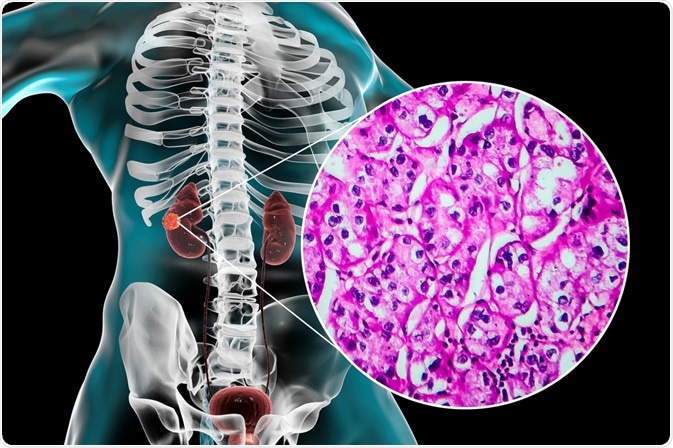Renal cell carcinoma is the most common form of kidney cancer in adults, accounting for almost 95% of cases diagnosed.
 Image Credit: Kateryna Kon/Shutterstock.com
Image Credit: Kateryna Kon/Shutterstock.com
In this disease, malignant cells originate in the lining of the proximal convoluted tubule, a small structure inside the nephron that reabsorbs water and solutes from filtrate in order to produce urine.
Renal cell carcinoma is one of the deadliest cancers to affect the genitourinary tract. This form of cancer is rarely detected in the early stages of the disease because there are often no obvious symptoms until it has reached an advanced stage.
However, if renal cell carcinoma is diagnosed in the early stages, the prognosis is usually positive. Patients diagnosed before the cancer has spread beyond the kidney have a 5-year survival rate of between 65% and 90%. Among those diagnosed after the cancer has spread, the 5-year survival rate is somewhat lower, at around 40% to 70%.
Some of the risk factors that have been identified for renal cell carcinoma include the following:
- Smoking
- Long-term misuse of certain pain relief medications, including over-the-counter products
- Some genetic conditions such as von Hippel-Lindau disease
Symptoms of renal cell carcinoma
By the time symptoms have developed in renal cell carcinoma, clinical features may include the following:
- Blood in the urine (hematuria) is present in around 40% of patients when they first seek medical advice. The concentration of blood is usually high enough to turn the urine red or dark brown.
- Flank pain is also present in about 40% of cases.
- A lump in the abdomen occurs in around 25% of cases, weight loss in 33%, fever in 20% and hypertension in 20%.
However, in about 50% of cases, patients do not present with any symptoms at all and the condition is only detected during routine check-ups for unrelated conditions when patients undergo an ultrasound, for example.
Paraneoplastic syndrome
Patients with renal cell carcinoma may also present with paraneoplastic syndrome, which refers to symptoms that arise as a result of the cancer being present in the body rather than as a result of the local effects caused by cancer cell growth. This syndrome may be caused by the tumor producing certain hormones, for example, or by the body’s immune response to the tumor.
Paraneoplastic syndrome occurs in around one fifth of patients who have renal cell carcinoma. Anemia is a common example of paraneoplastic syndrome and is caused by the underproduction of erythropoietin. By contrast, polycythemia may develop, which is caused by the overproduction of erythropoietin. Further examples of these syndromes include elevated blood calcium, thrombocytosis and secondary amyloidosis.
Renal cell carcinoma - an Osmosis Preview
Advanced-stage disease
As renal cell carcinoma progresses beyond the kidney, it eventually involves other areas of the body such as the lymph nodes, liver, lungs, bones, adrenal glands and brain. Further signs and symptoms of the condition that may develop as these tissues and organs are affected include:
- Loin pain
- General feeling of malaise
- Fatigue
- Loss of appetite
- Varicocele (swelling in the testicle tissue)
- Hypercalcemia
- Disrupted sleep
- Night sweats
Treatment of renal cell carcinoma
Renal cell carcinoma is one of the few cancers that has a poor response to chemotherapy, although a response is sometimes achieved with targeted therapies such as bevacizumab, sunitinib and interferon-alfa.
References
Further Reading
Last Updated: May 25, 2023